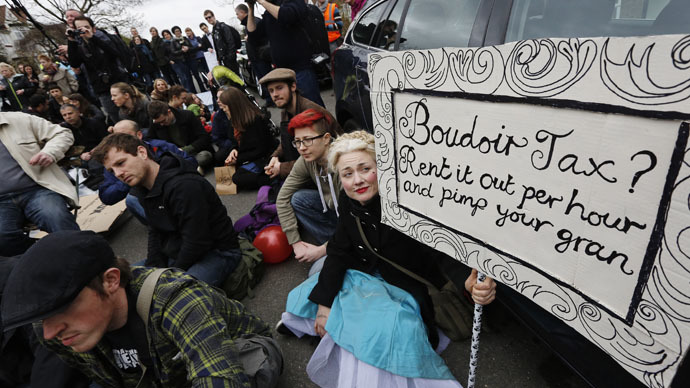‘Austerity regime squeezing hard’: Councils attacked for aggressive debt collection

Local governments in the UK have been attacked for their “excessive” use of court orders and bailiffs to recover people’s debts instead of offering advice on affordable repayment plans.
A survey by debt charity StepChange found that local councils are more likely to use aggressive enforcement measures to recover debts than they are to offer help.
StepChange’s survey of its clients found that even after they spoke to their council about their money problems, 62 percent were threatened with court action and 51 percent were threatened with bailiffs.
Only 25 percent of people were offered the option of paying in affordable installments, and just 13 percent were encouraged to seek debt advice.
The report found that council tax debt is one of the fastest growing problems it has seen in the past four years, and is second only to payday loans.
Meanwhile, activists and unions have condemned local governments’ use of court orders and bailiffs as “scandalous.”
READ MORE: 'Chance for a new start': Croatia writes off debts of 60,000 poorest citizens
StepChange claims the number of people seeking help for council tax arrears has tripled since 2010, with the average level of debt increasing from £675 to £832.
According to the report, just over half of StepChange’s clients are families with children, while 64 percent are women.
A quarter of people who approach the charity for help with debt are single parent families.
The survey also found that many people who fail to keep up with council tax payments are struggling with other debts – including credit card loans, overdraft payments, and payday loans.
A spokesperson for StepChange said councils need to be more responsible in how they approach people with debt.
“The changing nature of debt problems, where more and more people are struggling to meet their essential living costs, combined with changes to council tax benefits, have conspired to create a debt problem that has grown second only to payday loans,” the spokesperson told RT.
Just got our new survey back from @CitizensAdvice across the country. Lots of problems reported with bailiffs & aggressive debt collection.
— James Plunkett (@jamestplunkett) March 9, 2015
“Councils need to employ a more consistent, responsible, and proportionate approach to dealing with people in arrears, and not default to aggressive enforcement that often makes a bad situation worse,” he added.
Liane Groves, community national coordinator at Unite the Union, said the use of bailiffs is “scandalous,” as debt-burdened individuals are charged for the cost of sending them out.
“The use of bailiffs has grown astronomically since austerity. We completely condemn their use and believe local councils could be doing a lot more to help people,” she told RT.
“The Citizens Advice Bureau and Local Government Association came up with an agreement on how best to deal with people in debt...we would call on local governments to work within their own policies on debt collection,” Groves added.
READ MORE: Payday loan brokers help themselves to UK savers’ accounts, customers outraged
“It was scandalous that...if someone was in debt by a couple hundred quid, they would call the bailiffs and they’d end up with several more hundred pounds of debt.”
Eileen Short of campaign group Defend Council Housing blamed the effects of government austerity policies.
“The whole climate in Britain driven by the austerity regime is squeezing down hard on people with the least means,” she told RT.
Short-sighted benefits cuts and the bedroom tax are examples of how low-income households have been penalized by the government.
“Hundreds of people have been summoned to court for arrears of small amounts, but which have been caused by government cuts...we have been saying to councils you need choose which side you’re on,” Short said.












